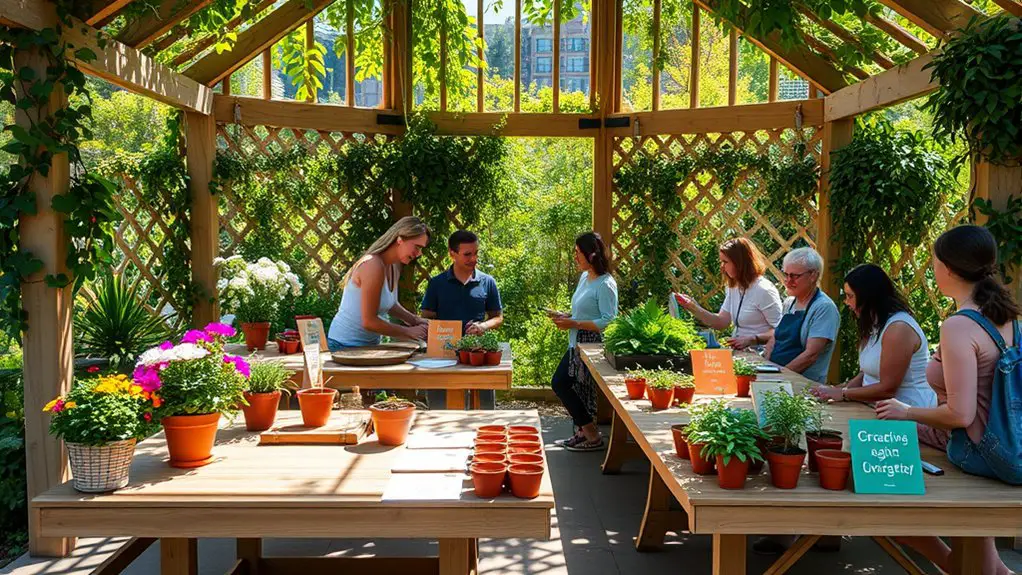To plan your organic gardening workshop in the gazebo, start by defining your goals and audience, whether beginners or seasoned gardeners. Choose a date that aligns with local climate conditions, and design an engaging curriculum focusing on practical organic techniques. Gather essential materials and supplies for hands-on activities. Promote your event through social media and local connections, then set up your gazebo for comfort. With these steps, you’ll create a memorable workshop experience, and there’s more to explore about community building and follow-up!
Determine Your Workshop Goals and Audience
When planning an organic gardening workshop, have you considered what you want to achieve and who your audience will be? Defining your workshop objectives is essential to guarantee it meets the needs of your participants. Think about your audience demographics: are they beginners, seasoned gardeners, or families looking to bond over gardening? Tailoring your content to their experience level will enhance engagement and learning.
For instance, if you aim to inspire beginners, focus on easy-to-grow plants and basic techniques. If you’re catering to experienced gardeners, explore advanced organic practices. Clear objectives help you stay on track and make your workshop truly valuable. Remember, a well-defined audience leads to a more fulfilling experience for everyone involved!
Choose the Right Date and Time
When planning your organic gardening workshop, it’s essential to choose a date and time that aligns with the local climate; this way, participants can fully engage with hands-on activities. Additionally, checking community calendars can help you avoid scheduling conflicts with other events that might draw your audience away. By being strategic about timing, you’ll guarantee a better turnout and a more enjoyable experience for everyone involved.
Consider Local Climate
Choosing the right date and time for your organic gardening workshop hinges largely on understanding your local climate. You’ll want to keep microclimate considerations and seasonal variations in mind to guarantee all participants have an enjoyable experience.
- Assess the average temperatures during your chosen season.
- Consider humidity levels that could affect comfort.
- Identify peak blooming times for local plants.
- Check for potential rain or wind patterns.
- Plan for daylight hours to maximize natural light.
Check Community Calendars
As you plan your organic gardening workshop, it’s essential to check community calendars to avoid scheduling conflicts and guarantee maximum participation. By ensuring your event doesn’t overlap with other community events, you’ll attract more attendees enthusiastic to learn about gardening resources.
Here’s a simple table to help you choose the right date and time:
| Date Options | Community Events | Best Time to Host |
|---|---|---|
| Saturday, May 5 | Local Farmer’s Market | 10 AM – 12 PM |
| Sunday, May 6 | Community Fair | 1 PM – 3 PM |
| Saturday, May 12 | Annual Gardening Expo | 11 AM – 1 PM |
Check these calendars regularly to make informed choices that resonate with your community, ensuring your workshop flourishes!
Design an Engaging Curriculum
To create an enchanting curriculum, focus on essential organic gardening techniques that participants can easily apply. Incorporate seasonal planting and care tips to keep everyone engaged throughout the year. Don’t forget to include sustainable pest management strategies that empower attendees to tackle challenges naturally.
Essential Organic Gardening Techniques
While you might think organic gardening is just about avoiding chemicals, it actually involves a variety of essential techniques that can transform your garden into a thriving ecosystem. To help your participants embrace these methods, focus on soil health and companion planting as foundational concepts.
- Soil Health: Teach techniques for enriching soil with organic matter.
- Companion Planting: Demonstrate how certain plants can benefit each other.
- Mulching: Show the benefits of protecting soil and retaining moisture.
- Natural Pest Control: Discuss methods like attracting beneficial insects.
- Crop Rotation: Explain how rotating crops can prevent soil depletion.
Seasonal Planting and Care
Understanding the rhythms of nature is key to successful seasonal planting and care in organic gardening. You’ll want to focus on seasonal crops and effective plant rotations to maximize yield and soil health. By choosing plants that thrive in each season, you can create a flourishing garden that changes with the seasons.
Here’s a simple guide to help you plan:
| Season | Recommended Crops | Care Tips |
|---|---|---|
| Spring | Peas, Lettuce | Regular watering |
| Summer | Tomatoes, Beans | Mulching for moisture |
| Fall | Kale, Carrots | Prepare soil for winter |
| Winter | Garlic, Onions | Cover with mulch |
| Year-Round | Herbs (e.g., Basil) | Prune regularly |
Engaging with seasonal planting will empower you and enrich your garden experience.
Sustainable Pest Management Strategies
As you cultivate your garden with seasonal planting, it’s important to reflect on how to protect your crops from pests without compromising your organic practices. Sustainable pest management strategies can empower you to maintain a thriving garden while respecting the environment. Here are some effective methods to take into account:
- Companion planting: Pair plants that naturally deter pests.
- Natural repellents: Use garlic, neem oil, or essential oils to ward off unwanted insects.
- Beneficial insects: Attract ladybugs or lacewings to control pest populations.
- Physical barriers: Employ row covers or nets to protect your plants.
- Crop rotation: Change plant locations yearly to disrupt pest life cycles.
Implementing these strategies will help you cultivate a healthy, vibrant garden that’s free from harmful chemicals.
Gather Necessary Materials and Supplies
| Material | Purpose |
|---|---|
| Seeds | Planting demonstrations |
| Soil or compost | Hands-on potting activities |
| Tools (trowels, gloves) | Engaging participants in planting |
Don’t forget to include educational materials, like brochures or visual aids, to enhance learning. By gathering these essentials, you’ll create an inviting and productive atmosphere that inspires your participants to embrace organic gardening. Happy planning!
Promote Your Workshop Effectively
How can you effectively promote your organic gardening workshop to attract enthusiastic participants? Start by leveraging social media platforms to spread the word. Create engaging posts that showcase what attendees can learn and experience. Here are some tips to help you connect with your audience:
- Share eye-catching visuals of your garden and past workshops.
- Use local community outreach to collaborate with nearby gardening clubs or farmers’ markets.
- Offer early-bird discounts or special promotions to incentivize sign-ups.
- Host a live Q&A session online to generate excitement and answer inquiries.
- Encourage participants to invite friends, fostering a sense of community.
Set Up Your Gazebo for a Comfortable Experience
Setting up your gazebo for a comfortable experience can make all the difference during your organic gardening workshop. Start by considering your seating arrangements; choose chairs that are not only comfortable but also easy to move around. A circle or semi-circle layout encourages interaction and fosters a sense of community. Next, think about lighting options. If your workshop extends into the evening, string lights or lanterns can create a warm, inviting atmosphere. Natural light is ideal during the day, so position your seating to take advantage of it. Adding personal touches, like potted plants or decorative cushions, can enhance comfort and reflect your gardening theme. This thoughtful setup will help participants feel relaxed and engaged, making your workshop a success. Additionally, incorporating outdoor lighting options will ensure your gazebo remains functional and beautiful throughout the event.
Follow up With Participants After the Workshop
Although the workshop may have ended, the connection with your participants shouldn’t. Following up is essential for participant engagement and enhances their learning experience. Here are some effective ways to keep the conversation going:
The workshop may be over, but maintaining participant connections is vital for ongoing engagement and enriched learning.
- Send a thank-you email with workshop highlights.
- Share additional resources or articles related to organic gardening.
- Encourage feedback collection through a brief survey.
- Invite participants to join a community group for ongoing discussions.
- Offer a follow-up session or Q&A to address lingering questions.
These steps not only foster a sense of community but also show you value their input. Plus, engaging with them post-workshop keeps their passion for organic gardening alive and motivates them to implement what they’ve learned!
Frequently Asked Questions
What Is the Ideal Number of Participants for My Workshop?
The ideal number of participants typically ranges from 5 to 15. This size enhances participant engagement strategies while allowing for meaningful interaction. Consider workshop size considerations to create a relaxed, effective learning environment for everyone.
Can I Host the Workshop During Inclement Weather?
You can still host your workshop in inclement weather by securing alternative locations, like a nearby community center. Just guarantee you’ve made weather preparations, so participants feel comfortable and engaged, regardless of the forecast.
How Do I Handle Dietary Restrictions for Food-Related Activities?
When planning food-related activities, consider dietary accommodations and food allergies. Ask participants ahead of time about their needs, and provide alternative options to guarantee everyone feels included and can enjoy the experience without worry.
What Is the Best Way to Collect Feedback From Participants?
To effectively gather feedback, consider using participant surveys. They’re simple and allow everyone to express their thoughts. Mix in various feedback methods, like informal chats, to guarantee you capture diverse perspectives and foster a collaborative atmosphere.
Are There Any Permits Needed for Hosting Workshops in My Gazebo?
You’d think hosting a workshop in your own backyard requires a mountain of permits! However, check local regulations and guarantee you have workshop insurance to protect yourself. It’s simpler than you might imagine!

